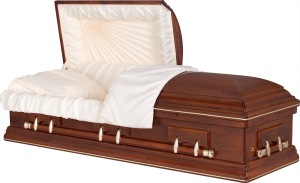Dead men don't pay

Death and socialism
“Right now, I have six of them ready to go that I can’t ship because there’s no glass.”
I’m sharing a few beers with an old friend. A cool February breeze makes its way through the skyscrapers of La Castellana, into the second floor of the arepera. A few yards away, the daily gridlock nightmare reminds us to take it easy, that we’re not going anywhere. In the entrance, a sign reassures us this restaurant is “100% gun free.”
My friend, an old college buddy, makes caskets for a living.
“Do you actually need the glass?,” I ignorantly ask her.
“Of course! Otherwise you would have to embalm the body. It would be a mess.”
I assume, I tell her, that she’s doing crisp business.
“Not at all,” she complains. “I sell to premium customers, and their death rates have not moved as much as those in with lower poder adquisitivo. And with all the problems in the supply chain, many people are choosing cremation. Besides, many of my customers have left the country.”
I ask her what the problems in the supply chain are.
“Well, I sell both wood and metal caskets. The wooden caskets are scarce. There are four wood suppliers in the country, and they are all importers. Local wood manufacturers have seen production plummet thanks to overzealous environmental regulation. As for imported wood, when it’s available, I buy and stock up. Right now I’m running low.”
“As for metal, I used to buy iron sheets made by Sidor, but thanks to electricity rationing, production has plummeted. The story is the same – whenever I find some in the black market, I buy the sheets.”
“Wait,” I tell her, “if you buy in the black market, do you sell at black market prices?”
She says no. If she sold at the controlled prices, she would operate at a loss. Instead, she gets around price controls by charging extra for the fancy handles, or the pillows, or the wood moulding.
“Sometimes,” she says, “I can’t find metal moulding, so I just have to use plastic moulding and dip it in nickel…”
But her biggest concern is glass. That, and lack of personnel.
“Many of my employees simply don’t show up for work, and with inamovilidad laboral, I can’t do anything about it.”
I detect a bit of weariness behind her enthusiastic eyes.
“I dunno. Sometimes I wonder why I do it, but family traditions are hard to break. The other day, the people from the Central Bank came to interview me about my factory – how many workers I employed, etc. I told them production was flat, as it has been for years. They didn’t believe me, saying that crime was up, therefore casket sales had to be up as well. I told them there was a bunch of pirata makers out there. They didn’t know, saying I was the only one they had listed… I told them to go and find out themselves who those people are.”
What is the morgue like, I ask her. “Are those your customers?”
“Oh, I don’t deal with the morgue, except on rare occasions. Did you know that now they ask you to bajarte de la mula at the morgue? No money, no body. Death is a serious business in this country.”
I wonder if she finds it difficult to deal with grieving relatives. Does she push the more expensive caskets to older grieving widows, or to the younger crowd?
That’s when she clarifies who her customers really are.
“Oh no, no,” she clarifies. “I sell to funeral parlors, I don’t deal with the dead, and I don’t deal with the morgue.”
“Dead men,” she says with a chuckle, “don’t pay.”
Caracas Chronicles is 100% reader-supported.
We’ve been able to hang on for 22 years in one of the craziest media landscapes in the world. We’ve seen different media outlets in Venezuela (and abroad) closing shop, something we’re looking to avoid at all costs. Your collaboration goes a long way in helping us weather the storm.
Donate




